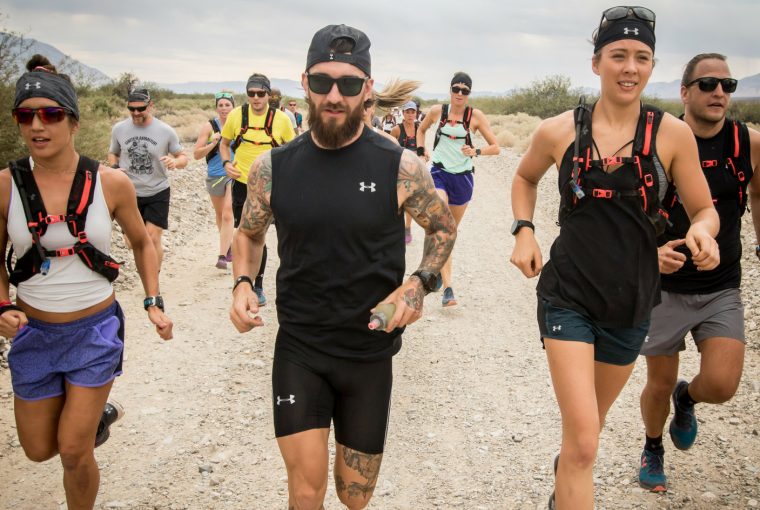Perhaps this goes without saying, but finishing an ultramarathon will make you feel like a total and utter badass. The final 100 m stretch of my first ultramarathon was a (so far) incomparable euphoric experience that constitutes one of my all-time favourite memories.
Yes, by their very nature, ultras are hard. It’s all there in their elevation profiles, extreme course distances, and even in many of their names, where words like ‘death’, ‘suffer’ and other ominous synonyms tend to frequent. But if you’re even considering signing up for an ultra, you probably already have a sneaking suspicion that there’s a heck of a lot more to these amazing events than their promises of physical suffering indicate.
In my experience, ultrarunners—as well as those who put on these events and those who volunteer for them—are among the most down-to-earth, encouraging, and categorically cool people out there. Although training for an ultra (and committing to completing one) is a decidedly personal and largely solitary endeavour, there’s something about suffering with others on purpose that drives a collective spirit that is downright palpable and incredibly inspiring. Race day magic is real, my friends.
Besides being a fantastic excuse to travel (if that’s your jam), ultramarathons are also an exceptional way to experience the natural glory of your own backyard. Not to mention that entrance fees often cost less than about $150 CDN, and gear requirements are relatively minimal.
Before really looking into it, I had no idea how many ultramarathon events actually exist—in Alberta, across Canada, and internationally. Seriously, there are tons of these things happening throughout the year. This is exciting news, because it means that with a little research,you can tailor your first ultra experience into one that really suits you.
I’ve left a few links below to wet your whistle, but a simple Google search of ‘ultramarathons in/near [your desired area]’ will likely bring up more than a few hidden gems. When you find one you like, do your research and sign up tout suite, as many sell out very quickly.
Getting excited? Read on for my 5 Tips for Completing your First Ultramarathon.
1. Know your race.
Ultramarathons come in all sorts of shapes, sizes and formats. Basically, an ultramarathon is defined as a foot race whose total distance exceeds that of a marathon. Beyond that, the variation is endless.
Most ultra websites offer a detailed course description, including specific terrain highlights, a course map complete with elevation profiles, between-station distances and time cut-offs, on-course water and food availability, pre-race registration requirements, and causes for disqualification. While you should expect and prepare for the fact that race day will inherently come with some surprises (more on that below), you do not want any of them to derive from a misunderstanding of what it is you will actually be doing or requiring on race day. Trust me on this one.
Side note: Before finishing my first ultra, I hadn’t even raced in an official half marathon, let alone a full one. While at least several months of ultra-specific training is typically necessary to safely and successfully complete an ultra, don’t let a lack of race experience stop you from signing up.
2. Walking is your friend.
Expect to walk – a lot – and train accordingly. Foolishly, and despite having read advice garnered from some of the most successful ultrarunners out there, my pre-first ultra training consisted almost solely of long-distance jogging and hill running. When it came to race day, I found myself desperately longing for runnable flats and suffering the most during the uphill walking segments, which made up at least half of my total race distance.
Walking involves different muscle recruitment patterns than running. Don’t be a me: even if you’re an experienced runner, swallow your pride and be sure to include long-duration uphill walking in your training.
3. Nutrition training is vital.
On race day, the specific foods you eat, how much and how often should be determined by what you know your guts can handle, and your water and electrolyte intake requirements are more important than I can adequately express here; while you do not want your first ultra to be bested by gastrointestinal issues, the last thing you want is to put yourself in a life-threatening situation for not having consumed an appropriate water-to-electrolyte ratio.
Ultrarunning nutrition is serious business and it needs to be fine-tuned to suit your anatomy. For a great introduction to ultra-nutrition, check out this REI article by Zuniga & Rand, (n.d.)
4. Comfort is king.
Experiment with different outfits during your training, pick the items you feel the most comfortable in, and run your race in those specific items (right down to your underwear, socks, and especially, shoes). Do not let chafing or a blister undermine your entire race day experience.
5. Set ultra-realistic race day goals.
Regardless of your level of preparation, the likelihood of something going wrong on race day is high – weather patterns change, shoes fall apart, injuries happen. The first ultra I ran was advertised as a 50 k race, but the actual race distance turned out to be closer to 56 k; apparently, this is pretty common. As such, despite my successful pacing throughout the race, that extra 6 k meant that I fell a little short of reaching my finishing time goal.
While I’m a huge advocate of positive thinking, I whole-heartedly believe that my pre-race expectation that something would inevitably go wrong actually allowed my first ultra experience to be a massively positive one. Time goals are great, but finishing (or even making it out of the starting line) is in itself an amazing accomplishment. Just make sure you take heed of race-specific time cut-offs, and put your best efforts towards being safe and having fun.
For an incomplete list of some popular Canadian ultras, check out: https://www.ultrarunner.me/country/canada
For more inspiration, check out: https://www.youtube.com/user/TheGingerRunner
Bio: Kathleen is a second-year student in Northern Alberta Institute of Technology’s Personal Fitness Trainer Diploma Program. An avid runner, yoga enthusiast and soon-to-be new mom, Kathleen loves learning about how exercise affects the human body, and she couldn’t be more excited about embarking on her career as a fitness professional.




